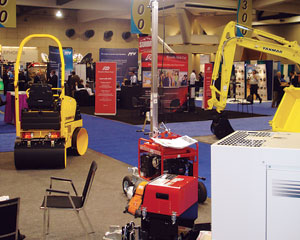Even with Congress’ proposed economic stimulus package, which could drive tens of billions of dollars to construction equipment sales and extend tax benefits, financial help provided by the government will come too late to boost this year’s economy, industry observers say. For that reason, capital-goods suppliers are already prepared to write off 2009 as a dismal year and are looking ahead to 2010.

“I think any kind of turnaround is going to be slow,” says Rich Carlson, vice president of Minnesota-based Carlson Tractor and Equipment Co. His company had a poor 2008, and 2009 is not looking so good, either. “I think the hope is that it doesn’t get any worse,” he adds.
Gerry Couch, president of King of Prussia, Pa.-based Modern Equipment Sales and Rental, is supportive of the proposed stimulus package but has questions about how it will be implemented. “I do believe [the stimulus] will make a difference, but not in 2009,” he says.
Those feelings were echoed by many at the Associated Equipment Distributors’ annual meeting, held Jan. 14-17 in San Diego. The Oak Brook, Ill.-based trade group saw attendance drop 20% to 25% from 2008, show organizers said.
The equipment exposition opened on the same morning that the House announced its proposed economic stimulus package. One of the bright spots that AED members pointed to is a proposed extension of accelerated depreciation and increased expensing allowances for capital equipment under Section 179 of the Internal Revenue Code, stimulus provisions which expired Dec. 31. The extensions mean that dealers and other small businesses would be able to cut their 2009 tax bills and free up more cash to spend in the present year.
In addition to public-works spending, the package also calls for increased funding for clean-diesel retrofits, new research dollars for alternative fuels, as well as new trucks and other capital equipment for government agencies. “Stimulus is coming and equipment distributors will be among the first beneficiaries,” says Christian Klein, AED vice president of government affairs.
In terms of infrastructure, AED studies show that federal spending on construction projects has a direct impact on equipment suppliers and the services they provide. For example, the association says that every federal dollar spent on roads and sewers translates into 6.4¢ and 12¢, respectively, in new equipment. That could push billions of dollars toward the likes of Caterpillar, John Deere, Komatsu and their affiliates if the House plan moves forward.
Even so, suppliers are feeling pessimistic overall. According to a forecast produced by Wells Fargo and released at the AED show, equipment dealers and contractors are feeling their worst in the survey’s 33-year history. Wells Fargo’s “optimism quotient,” a figure used to track the industry’s mood, fell to its lowest level ever—42. Although the survey’s questionnaires went out in September and October, when the financial markets were in chaos, the result is still well below previous years’ levels. It hit 80 in 2008, 86 in 2007 and 102 in 2006. A number above 100 is considered optimistic, between 75 to 100 is optimistic but cautious and anything below 75 is pessimistic, according to Ron Riecks, general manager for Wells Fargo Construction. “There isn’t really a way to put a positive spin on this year’s survey,” he says.
The fiscal problems are forcing companies to take a harder look at how they operate so they can make it through 2009. For example, Couch says rental rates are dropping because of increased competition. At the same time, his company has more opportunity to sell used equipment. Also, when contractors lay off staff those firms may need help to service and repair their goods. “We can take care of those businesses,” he says.
The downturn also was hard to prepare for because it came fast and steep, says Dave Lundin, president of Litchfield, Minn.-based Towmaster Trailers, an exhibitor. Any aid the federal government provides will not come fast enough, added Janelle Johnson, the company’s chief financial officer. “If it moves through government, it will take time,” she says. “It always does.”

Post a comment to this article
Report Abusive Comment